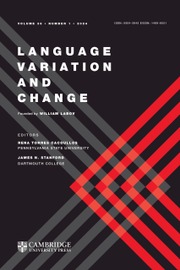Article contents
New perspectives on an ol' variable: (t,d) in British English
Published online by Cambridge University Press: 16 September 2005
Abstract
A quantitative analysis of -t,-d deletion in contemporary British English reveals that preceding and following phonological contexts are significant, indicating that there is a universal constraint on -t,-d deletion consistent with universal phonetic and phonological properties of segments. However, in contrast to previous research, morphological class is not significant. Furthermore, our results do not support the hypothesis that -t,-d deletion is a variable rule that applies both lexically and postlexically. In sum, -t,-d deletion is a robust phenomenon in contemporary British English, but there are striking differences between British and North American varieties. Such differences suggest that -t,-d deletion is an ideal case study for further investigation of the phonology-phonetics interface, and adds to the available evidence from which an explanatory account of -t,-d deletion can be constructed.The first author acknowledges with gratitude the generous support of the Economic and Social Research Council of the United Kingdom (the ESRC) for research grant #R000238287, Grammatical Variation and Change in British English: Perspectives from York. We are also grateful to Ms. Heather A. Davies, who made it possible for us to work for a time in the same geographical location, as a result of which our original conception of the article was transformed. We would like to thank members of the phonetics/phonology research group at the University of York and our audiences at the following conferences for their comments and suggestions: VIEW 2000, University of Essex; NWAV 30, North Carolina State University, 2001; and the Biennial Meeting of the British Association of Academic Phoneticians, University of Newcastle-upon-Tyne 2002. Our anonymous reviewers deserve special mention as their insights prompted exacting revisions to our original manuscript. The result, we believe, is a stronger article; however, if points of contention remain, we welcome further discussion.
- Type
- Research Article
- Information
- Copyright
- © 2005 Cambridge University Press
References
REFERENCES
- 62
- Cited by


